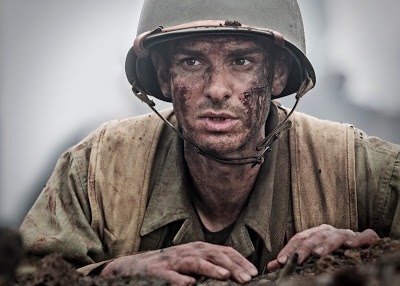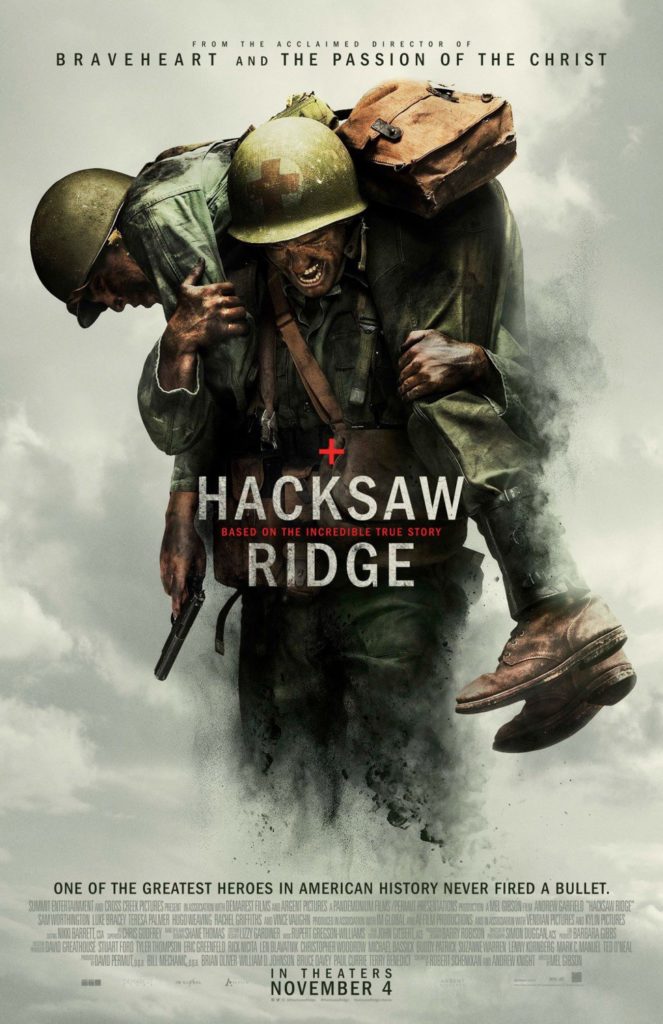Hacksaw Ridge (2016)
CAST: Andrew Garfield, Teresa Palmer, Vince Vaughn, Sam Worthington, Hugo Weaving, Rachel Griffiths, Luke Bracey
REVIEW:
The true story of Desmond Doss, the first Conscientious Objector to receive the Congressional Medal of Honor for saving seventy-five men without firing a shot during the bloody Battle of Okinawa in WWII, Mel Gibson’s Hacksaw Ridge (called the troubled actor-director’s “comeback project” in some circles) is a curious but overall effective blend of sappy cliches and graphic war violence, a film which initially threatens to come across like a generic “uplifting” story but—mostly when our pacifist protagonist finally goes to war around the halfway point—ultimately takes a turn to something far less sanitized but ultimately powerful and inspirational.
Desmond Doss (played as a child by Darcy Bryce) grows up in the hills of Virginia with his brother Harold (Roman Guerriero, later Nathaniel Buzolic), with whom he has a sometimes fiercely competitive relationship, loving mother Bertha (Rachel Griffiths), and troubled father Tom (Hugo Weaving), a WWI veteran plagued by PTSD and survivor’s guilt and prone to violent drunken outbursts. As a young man, despite his gangly physique and borderline Forrest Gump levels of social awkwardness, Desmond (now played by Andrew Garfield) manages to woo a pretty nurse, Dorothy Schutte (Teresa Palmer) and enlists after Pearl Harbor alongside his brother, against their father’s wishes. But while Harold enlists as a conventional soldier, Desmond—a devout Christian and a staunch pacifist who has renounced violence after a childhood fight that got out of control where he seriously injured his brother, and a later ugly incident where he wrestled a gun out of his father’s hand during one of his father’s psychotic episodes—signs up as a Conscientious Objector, intending to serve as a combat medic and refusing to carry a gun. His drill instructor Sergeant Howell (Vince Vaughn), commanding officer Captain Glover (Sam Worthington), and some of his fellow cadets, principally the belligerent Smitty (Luke Bracey), are not impressed with Desmond’s religious convictions and resort to abusive methods to try to send him packing even as they slowly gain a grudging respect for his tenacity, but Desmond is unwavering even when he faces a court martial (which he escapes thanks to his estranged father’s WWI service with an influential General). Having gained the right to stay in the Army as an unarmed medic, Desmond eventually winds up scaling Hacksaw Ridge, a 400 foot high, seemingly unassailable Japanese fortified position, during the crucial Battle of Okinawa in the last months of WWII. There, those who saw Desmond as a coward will be proven wrong beyond their wildest expectations.
Hacksaw Ridge begins adequate but undistinguished, a workmanlike biopic of the central character’s childhood and pre-war life, from his awkward courting of his love Dorothy—complete with slightly cheesy picturesque shots of them locked in a passionate embrace against the panoramic backdrop of the Virginia blue ridge mountains—to a generic basic training sequence where we run through a bunch of cliches of the love interest, the gruff drill sergeant, the squad mates who think he’s a coward and subject him to hazing, etc. These scenes aren’t poorly-done, per se (although Vince Vaughn’s sergeant feels like a watered-down knock-off of characters played by R. Lee Ermey or Louis Gossett Jr.), but they don’t really do much to distinguish themselves from various other similar scenes we’ve seen before.
The movie hits its stride when we finally get to Hacksaw Ridge around the midway point. Mel Gibson’s forte as a filmmaker lies more with bloody battles than quiet character moments. Anyone who’s seen Braveheart knows Gibson knows how to handle large-scale battle scenes, and likewise anyone who’s seen Braveheart, Apocalypto, or The Passion of the Christ knows he doesn’t shy away from gruesome violence. Up until we leave for war, Hacksaw Ridge is fairly tame and inoffensive. That changes when we enter battle, where the violence is every bit as bloody and graphic as the likes of Saving Private Ryan or Fury. Gibson holds nothing back when it comes to depicting what happens when bullets, artillery shells, or flamethrowers come into contact with human heads and bodies, to an extent that some audience members may find difficult to take. At the same time, while effectively conveying the chaos of battle, Gibson choreographs expertly enough that, while we understand the characters’ confusion, the action is never hard for the audience itself to follow.
It’s also here that Desmond proves his worth to his various doubters, not by blowing away hordes of enemy soldiers, but by saving lives instead of taking them. It’s a lower-key, perhaps less “flashy” form of heroism, but no less valid or worthy of admiration, as Desmond stays behind on a one-man rescue mission, braving both Japanese soldiers scouring the area and the US Navy’s artillery bombardment, methodically rescuing one wounded soldier after another (seventy-five in total) with little to no regard for his own safety, all without firing a single shot. Some around Desmond, even those who sympathize to an extent (such as Sam Worthington’s Captain Glover) find his pacifist principles misguided and unrealistic, but no one can fairly accuse him of not having the courage of his convictions.
 It’s nice to see that Andrew Garfield’s career hasn’t been completely torpedoed by his involvement with the 2012-2014 Spider-Man reboot misfire, and while his awkward mannerisms are initially slightly off-putting (as was also the case with his occasionally abrasive Peter Parker), he does a solid job playing Desmond as a socially awkward, simple, and sincere man of unwavering convictions. As the standard-issue abrasive drill sergeant who eventually shows a more sympathetic side, Vince Vaughn gets a few amusing one-liners but as movie drill sergeants go, he’s no R. Lee Ermey, while Teresa Palmer is relegated to the thankless role of the girlfriend waiting at home. Other supporting roles include Sam Worthington as Captain Glover, who like Sergeant Howell finds his opinion of Desmond radically changed over the course of events, Luke Bracey as Desmond’s squad mate who accuses him of cowardice but eventually becomes a comrade-in-arms, Rachel Griffiths as his mother, and Richard Roxburgh as an army psychiatrist. The biggest impression in the supporting cast comes from Hugo Weaving, in a small but moving performance as Desmond’s troubled war veteran father, demonstrating that he’s fully capable of playing against “Agent Smith” typecasting. Mr. Doss won’t be winning any father of the year awards, but it’s clear he loves his sons (when alcohol and PTSD don’t completely have him in their grip) and doesn’t want to see them experience the same horrors that have left him so damaged.
It’s nice to see that Andrew Garfield’s career hasn’t been completely torpedoed by his involvement with the 2012-2014 Spider-Man reboot misfire, and while his awkward mannerisms are initially slightly off-putting (as was also the case with his occasionally abrasive Peter Parker), he does a solid job playing Desmond as a socially awkward, simple, and sincere man of unwavering convictions. As the standard-issue abrasive drill sergeant who eventually shows a more sympathetic side, Vince Vaughn gets a few amusing one-liners but as movie drill sergeants go, he’s no R. Lee Ermey, while Teresa Palmer is relegated to the thankless role of the girlfriend waiting at home. Other supporting roles include Sam Worthington as Captain Glover, who like Sergeant Howell finds his opinion of Desmond radically changed over the course of events, Luke Bracey as Desmond’s squad mate who accuses him of cowardice but eventually becomes a comrade-in-arms, Rachel Griffiths as his mother, and Richard Roxburgh as an army psychiatrist. The biggest impression in the supporting cast comes from Hugo Weaving, in a small but moving performance as Desmond’s troubled war veteran father, demonstrating that he’s fully capable of playing against “Agent Smith” typecasting. Mr. Doss won’t be winning any father of the year awards, but it’s clear he loves his sons (when alcohol and PTSD don’t completely have him in their grip) and doesn’t want to see them experience the same horrors that have left him so damaged.
Hacksaw Ridge ends with a brief snippet of a 2003 interview with the real Desmond Doss (who passed away in 2006), as well as several other people we’ve seen portrayed onscreen. Despite providing the postscript to a film lionizing his efforts, Doss downplays any label of “hero” and insists the real heroes are the ones buried in military graveyards. But whether the real Doss may have seen himself worthy of the title or not, Hacksaw Ridge provides an ultimately powerful and compelling tribute to one of the less famous heroes of WWII, one who proved that there are various ways to serve in war, and that saving lives can be no less courageous and meritorious than taking them. Hacksaw Ridge might start out threatening to try too hard to be inspiring, but ultimately, that’s what it ends up accomplishing.
* * *
